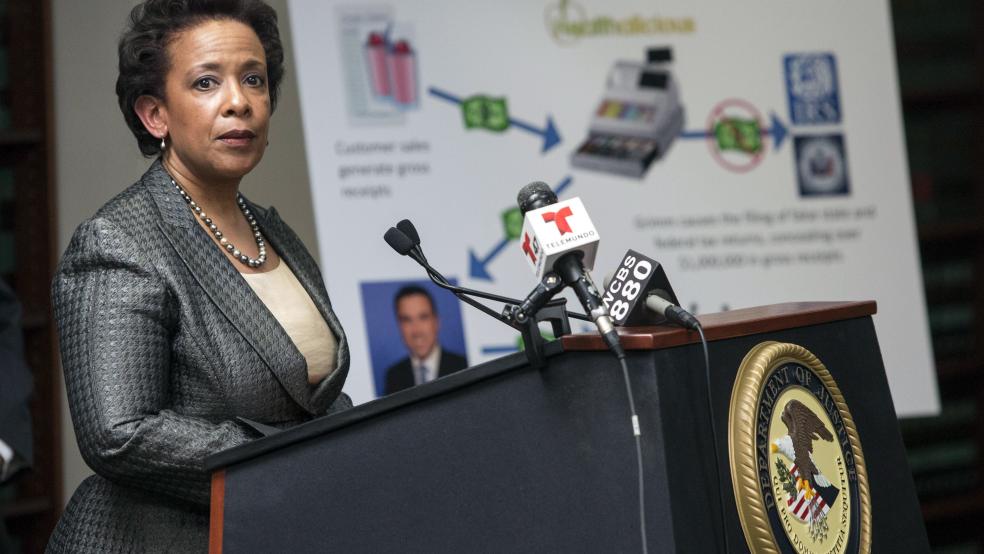Attorney general nominee Loretta Lynch, nominated by President Obama in November, will get a confirmation vote in the coming days under a deal announced Tuesday morning by Senate leaders that ends a weeks-long impasse sparked by partisan divides over immigration and abortion.
"I'm glad we can now say there is a bipartisan proposal that will allow us to complete action on this important legislation," Majority Leader Mitch McConnell (R-Ky.) said Tuesday morning, about a bill combating human trafficking that became a roadblock to Lynch's confirmation. "As soon as we finish the trafficking bill ... we'll move to the president's nominee for attorney general hopefully in the next day or so."
Democrats have filibustered the anti-trafficking bill since it came to the Senate floor in late February due to abortion restrictions embedded within it, and Republicans vowed not to move forward with Lynch's confirmation until the trafficking bill is dealt with.
The deadlock was broken after both parties agreed on language specifying that a victims' fund established by the legislation would not be used for healthcare or medical services, and thus not for abortions. Trafficking victims would instead be eligible for health care under a separate program already subject to the longstanding abortion restrictions known as the Hyde Amendment, which contains exceptions for cases of rape and incest.
The deal came together after weeks of tough talk from both sides and mounting pressure from outside groups urging Republican leaders to move forward with an up-or-down vote on Lynch.
Minority Leader Harry M. Reid (D-Nev.) on Monday accused Republicans of "pushing around Loretta Lynch for sport" and trying to "dupe American women." But behind the scenes, senators and staff were putting the finishing touches on a deal. Patty Murray (D-Wash.) and Amy Klobuchar (D-Minn.) played key roles in negotiating with John Cornyn (R-Texas), the lead author of the anti-trafficking bill.
"This is really good news," Reid announced Tuesday morning, speaking on the Senate floor after McConnell. "This compromise is evidence that when Republicans and Democrats sit down together and work toward a solution, great things can happen. The Senate needs more of this."
Cornyn said in a statement he was "thrilled we were finally able to come together to break the impasse over this vital legislation, and I look forward to swift passage in the Senate so we can ensure victims of human trafficking receive the resources they need to restore their lives."
Fifty-one senators have publicly stated their support for Lynch, likely assuring her confirmation once McConnell brings it to the floor. Most Republicans, however, continue to oppose her -- most of them citing her support for President Obama's authority to take executive action on immigration.
Senate Republican leaders felt increasing pressure to move forward with Lynch -- not so much because of the Democratic attacks, but because of their own high hopes for a productive six-week work session. Waiting for floor consideration are major policy measures, including a bipartisan bill setting out a congressional review of a potential nuclear deal with Iran, a bill to strengthen national cyber-security efforts and, next month, legislation granting President Obama "fast track" trade authority.
The Senate could start taking up amendments to the trafficking bill later Tuesday, setting up a vote for final passage late Tuesday or Wednesday. Unless all senators agree to move forward with Lynch's confirmation, which is unlikely given the rancor surrounding her nomination, a procedural vote would have to take place, pushing her confirmation until Thursday or perhaps early next week.
Pitfalls remain, particularly in the amendments that might be offered to the anti-trafficking bill. Reid on Tuesday warned Republican leaders to be "very, very careful" as they move forward.
"Each side is going to have to be cautious in what they offer, because any one of those amendments, as we know, can cause a mini filibuster, or a maxi filibuster, depending on how you look at it," he said. "We don't need to get involved in that."
This article was published originally in The Washington Post
Read More at The Washington Post:




